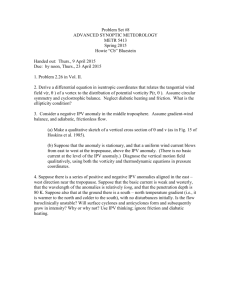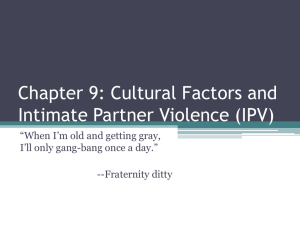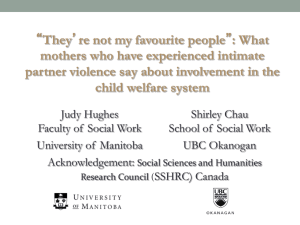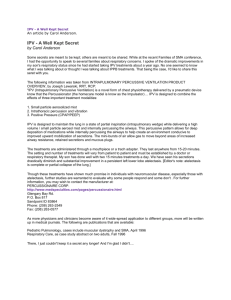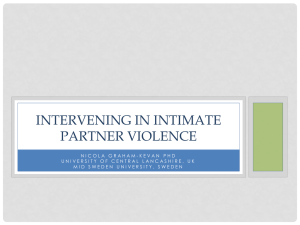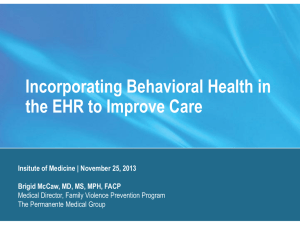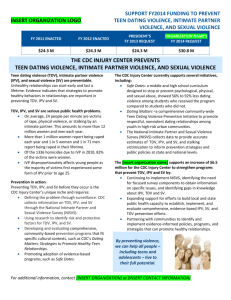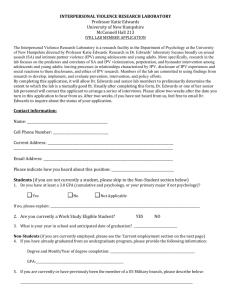Breakout Presentation - Discover Dalton State
advertisement
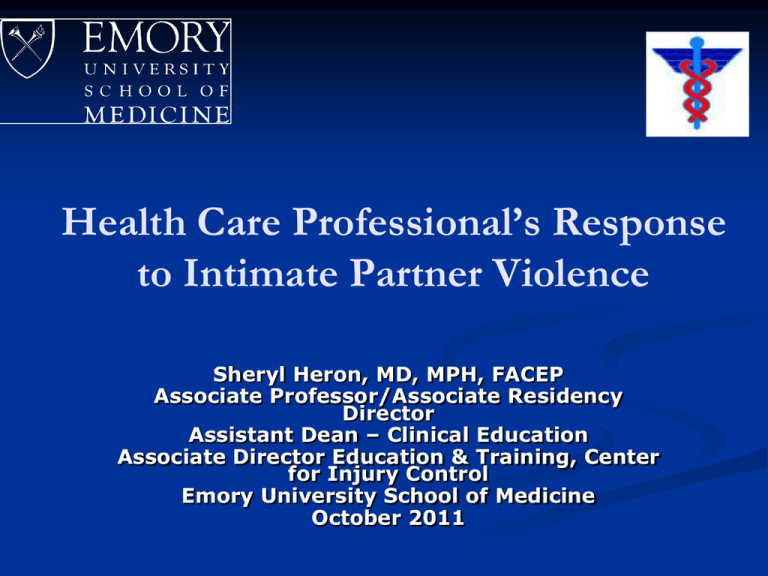
Health Care Professional’s Response to Intimate Partner Violence Sheryl Heron, MD, MPH, FACEP Associate Professor/Associate Residency Director Assistant Dean – Clinical Education Associate Director Education & Training, Center for Injury Control Emory University School of Medicine October 2011 Disclosure Statement I have no financial relationship in any amount with a commercial interest to disclose Introductions • Who you are? • Why are you here? Objectives • Review the Health Consequences of IPV • Describe Strategies to Improve the health professional’s response • Demonstrate a Systemic Response to IPV Intimate Partner Violence (IPV) • Physical, sexual, or psychological harm by a current or former partner or spouse. • heterosexual or same-sex couples • does not require sexual intimacy • IPV can vary in frequency and severity Centers for Disease Control & Prevention - 2000 Patient 1 20 yo female presents s/p GSW to the head. On presentation she is in traumatic arrest US notes IUP at 3 months. Patient 2 30 yo female presents to the ED, c/o “being tired, recently unemployed”. Her 2 kids are with her. On exam, she is febrile at 38.2 and on auscultation of her lungs, she has bruises to her chest. In the literature By gender • Male and female perpetration of violence is equalizing, but: • • • Women tend to report victimization more Men tend to perpetrate more severe violence in most surveys, incl. homicide Women tend to sustain more injuries and 3x more like to report more fear/ battering Houry D: J Interpers Violence. 2008; 23(8):1041-55. Medical settings • • • • • Obstetrics/gynecology- 12.7% Pediatrics- 8.4% Primary care- 8.6% Addiction recovery- 36.2% Emergency department- 16.5% McCloskey: Acad Emerg Med. 2005;12(8):712-22 Pre-hospital • • DV victims more likely to call 911 for any reason (77% vs. 47%) (Datner 1999) DV-positive patients more likely to refuse EMS transport (23% vs. 7%) (Husni 2000) • More DV patients presented during the EMS night shift Associations with IPV • • • • • • • • • Young (mean age 32) Female (62%) Unemployed (60%) Street drug use (29%) Cigarette smoking (59%) Depression (36%) PTSD (21%) Suicidal (10%) Houry D Does Screening In The Emergency Department Hurt Or Help Victims Of Intimate Partner Violence? Annals of Emergency Medicine 2008;51:433-42 Physical Morbidity • Physical injuries • Disfigurement or disability • Chronic body pain (e.g., abdominal, headache) Physical Morbidity • Miscarriage or abortion • Sleep and appetite disturbances • Recurrent vaginal infections (e.g., STDs) • Other complaints (gynecological, cardiac, central nervous system) Homicide ED Use Prior To Death 139 homicide victims (5 years, 12 hospitals) 34 (25%) were IPV victims 15 (44%) presented to the ED < 2 years 14 had injuries 8 head lacerations; 2 perineal lacerations; 2 rapes; 1 suicide attempt Medical records suggestive of abuse in 8 IPV documented in 2; no intervention Arbuckle J et al: Ann Emerg Med. 1996 Feb;27(2):210-5. What questions to ask? HITS Scale • • Hurt; insulted; threatened with harm; screamed at you Danger Assessment Scale • • Increasing risk of lethal events with each “yes” answer Frequency/severity of violence, presence of weapon, substance use, suicidal or homicidal intent, violence towards children What questions to ask? SAFE • • Safety; afraid/abuse; family/friends; emergency plan Abuse assessment screen/ Index of Spouse Abuse/ Conflict Tactics Screen • • Utilized in research Labor intensive What questions to ask? Partner Violence Screen (Feldhaus 1997) • Have you been hit, kicked, punched, or otherwise hurt by someone in the past year? If so, by whom? • Do you feel safe in your current relationship? • Is there a partner from a previous relationship who is making you feel unsafe now? Patient attitudes about screening • • • 78% favored routine screening (Friedman 1992) 85% of patients feel it’s appropriate for health providers to ask questions about violence (Houry 1999) 36% of DV victims would tell a physician only if asked directly (Hayden 1997) So… what do you do with this information? How effective is screening for and identifying victims? Does it prevent or predict future violence? Is it safe? Why does screening matter? Women who screened positive for IPV in the ED • Re-interviewed 4 months later about violence in the interim: • 11.3 times more likely to experience physical violence • 7.3 times more likely to experience verbal aggression • All women who sought medical treatment for injuries had screened positive for IPV Houry D et al: J Interpers Violence. 2004 Sep;19(9):955-66 Is it safe? 2,134 screened for IPV • 281 victims followed up at 1 week & 131 at 3 months • No problems in the ED • No problems from participating in the study at 1 week • All were satisfied with the screening • 1 “reminded her of the violence” Houry D et al Annals of Emergency Medicine 2008; 51(4):433-42 Is it Enough? Paucity of evidence for effective treatment and services (MacMillan – JAMA 2009) Lack of evidence that screening alone improves health outcomes (Moracco – JAMA 2009) Responses of Health Professionals to IPV • • • • • • Identification Evaluation Treatment Documentation Safety Planning Referral Identify & Evaluate • First you have to get there! • If it doesn’t make sense……………… • THINK IPV or SEXUAL ASSAULT!!! Presentations • Traumatic injury • Suicidal/ depression • Vague complaints Presentations • Abdominal pain (no determined etiology) • Chronic pain • Headaches • Multiple visits Patterns of Injury Injury patterns • Incompatible with history • Multiple injuries in various stages of healing • Defensive injuries • “Central Pattern” of injury Injury locations 9,057 women (280 acute IPV) • • • • • Neck (OR 15.9) Abdomen (OR 9.8) Face (OR 8.9) Thorax (OR 5.5) Head (OR 4.9) Muellemann et al: Annals of Emergency Medicine - 1996 Physical Examination • Physical Exam • Injury pattern: head, neck, torso, genitalia • “Central Pattern of Injury” • Look for bruises, throat injuries • Wounds in various stages of healing • Evaluate patient’s emotional state • Pregnant Patients – FHT’s Treatment – Medical Team • Treat injuries • Treat other physical complaints • Create safety plan • Secure legal advocacy Documentation • Medical records • Police reports • Protection orders • Witnesses Safety Planning/Advocates/Referral • • • Ensure Patient Safety Involve Advocates EARLY Marshall support • • • Spiritual Family Social Services Benefits to Trained Medical Personnel • • • • • Collaboration and involvement with community leaders and resources Relate medical needs of victims to community members and groups Advocacy Learn about impact of violence on other aspects of a patient’s life Knowledge of community laws and responses How does the community engage the medical community? • • • • ASK! Solicit Universities Challenge your physician during visits Note Authors of papers/ lecturers and invite them to participate How to involve “Medical Professionals” with the task force • What’s in it for me?? • • • • Your expertise Medical aspect of IPV Fatality reviews Medical-legal issues (mandatory reporting) Georgia statute (31-7-9) • Physicians, licensed registered nurses, and other medical personnel “having cause to believe that a patient has had physical injury or injuries inflicted upon him other than by accidental means” must report this to the person in charge of the medical facility; this person in turn shall notify local law enforcement Challenges for Medical Involvement • • • • • • • Lack of DV education Lack of time Lack of effective interventions Powerlessness Fear of offending the patient Privacy concerns Personal history of abuse Other Challenges? • • • • On-call emergencies Night and weekend shifts May not understand community or local priorities Time commitment How do we Address these Challenges? • Educate health professionals – go to Grand rounds, lectures • Reiterate the seriousness of IPV • Understand the time constraints, give them something to work with How do we Address these Challenges? • Reinforce it’s not a medical rather a societal issue • Family/Friends are affected • It’s the right thing to do Benefits To Medical Involvement Medical Personnel: • Direct access to survivors of IPV • Bring a relevant perspective on the realities of health and mental health issues facing survivors • Potential financial strength to assist lobbying efforts Benefits To Medical Involvement • Medical Personnel: • Builds a scientific data base which can be used to leverage funding (i.e. track injuries, etc.) • Strengthens the collaborative community response • Demonstrates Leadership Patient Discussions • Patient 1: • Patient 2: Patient 1: IPV & Pregnancy • Assessment • • Approach • • Documentation • • Referral Patient 1 • IPV HOMICIDE/PREGNANCY • http://www.ajc.com/news/no-bond-for-man-117116.html • Partners are responsible for >50% of homicides during pregnancy in U.S. • Increased risk of miscarriage and LBW infants • HOW DO YOU APPLY THIS CASE TO OTHER PATIENTS? IPV in Adolescents (n= 570)* – Prospective study Adolescent girls – IPV highest at 3 months post partum (21%), lowest at 24 months (13%) • Highest in African American & Mexican Amer. – 78% at 3 mos post partum did not report IPV prior to delivery. • High risk period, important to screen Harrykissoon et al. Arch Pediatr Adolesc Med. 2002; 156: 325-330 Patient 2 – IPV & Children • Assessment • Approach • Documentation • Referral Violence & Children • 15.5 million Children live in families with IPV – (Whitfield et al. Journal of Interpersonal Violence, 2003) • 2/3rd of IPV of women occur at home where 38% of children under 12 are witnessing • (Catalono – 2007 US Dept of Justice) • 16,458 were living in a domestic shelter (National Network to End DV – 2009) What Can You Do/Say? • I am sorry • This is not your fault • You don’t deserve this • I can offer you help • Are you safe to go home? Why diagnose it? • Failure to diagnose/inquire sends a message • Cycle will not stop • Window of opportunity to intervene • Legal responsibilities A Coordinated Community Response • Health Care and Mental Health System • Social Support Community Educational System Criminal Justice System Shelter Community Business Community Faith Community • • • • • Resources on Intimate Partner Violence (National, State, Local) National DV Hotline – 1-800-799-SAFE Ga Shelter Hotline – 1-800-33-HAVEN National Coalition Against Domestic Violence www.ncadv.org Ga Commission on Family Violence – 404-657-3412, www.gcfv.org GA Coalition Against Domestic Violence 404-209-0280, www.gcadv.org/ Conasauga Family Violence Alliance Northwest Ga Family Crisis Center Ga Commission Family Violence • Medical Protocol • • Revised 12/09 2 Primary Goals • Incidence & Prevalence of IPV through enabling hospitals, medical clinics and healthcare providers to respond appropriately to IPV • Reduce the likelihood of violence developing into a pattern of repeated assault and emotional suffering http://gcfv.org/files/medical.pdf Testimonial Dear Dr. Heron, I don't know if you remember me. I was working for Jezebel magazine last July and came in to have stitches removed from my arm because I had put my arm through a window. I was dating Ray from the "Cindy and Ray" show who was being horrible to me (to put it mildly) and I hated my job because my boss was making me feel like I was worthless. I was about to have a nervous breakdown and you saved me. You were my guardian angel. You closed the door and talked to me, told me I was better than all of this. I know that God sent you into that room that day to send me a message. GET OUT AMY! And get out I did! I quit my job, broke up with Ray and moved out of Atlanta and home to Palm Beach. Now I am getting my MBA and happier (and healthier) than I have ever been in my life! I run 3 miles a day and go to church ( or at least try to) as much as I can! I pray a lot! Thank you so much Dr. Heron! If you hadn't been there to wipe my tears that day and give me a hug I don't know what I would've done. You were more than a doctor that day, you were my saving grace and my friend. You said you couldn't wait until I emailed you about the new man in my life and my three beautiful children. Well, I'm not there yet, but there is time, thanks to you! Thanks again, I owe you my life! You are a God send! You are a remarkable doctor and person! I am sorry it has taken so long to send this to you but just know that you are always in my thoughts and prayers! Warmest regards, Amy Saleeby Testimonial Hi Dr. Heron! I am so happy to hear back from you! Of course you can share my email with the your students! I hope it will make for more doctors like you! Thank you again for saving my life! I don't know what I would've done if you hadn't been there that day. I know God sent you in that room to talk some sense into me. I will never understand how I put up with such utter crap from that jerk of a boyfriend and a boss. THANK YOU!!!!! My parents and friends thank you too!! You definitely found your calling girl. I'm sending a picture too! Testimonial Hi Dr. Heron! I wanted to write an email while I remembered to wish you a very happy birthday on Friday! I believe I may have missed last year's but you are always in my thoughts as the person who gave me a second chance at life! I have been telling the story of how God sent you into my life when I was at my worst and how you will always be my proof that living angels do exist! Life is a little crazy, but all good. I'm dating the man of my dreams. He's an angel like you! I'm pretty sure he's "the one." Wow is it crazy to write that! I have actually talked to Ray (boyfriend on the radio who was not good to me) and everything there is good as well. I forgave him and let go of all that crazy abusive past. I left Clear Channel a year ago and started my own events and marketing company. This Halloween I am producing the biggest event of my life and I'm a lot nervous! But I have faith that it will all go as it should. How are you? Are you still in the ER at Emory? I hope are well as you deserve nothing but good things in life! As I mentioned you have been on my mind a lot lately. I hope that means really good things are happening for you! Have a HAPPY HAPPY BIRTHDAY! I hope you get everything you wish for and more this year! It's going to be your best year yet. I can feel it! I hope to hear from you but if I don't and life is just as crazy in your world, know that there is a gal in FL who will never forget you. I always pray that good things come your way. :-) Take care, Amy Saleeby Summary • Health Consequences of IPV • Strategies to Improve the health professional’s response • Reviewed a Systemic Response to IPV Take Home Points • IPV is the most common cause of assaultrelated injuries in women • Health professionals are vital • Resources are available to assist in your efforts Take Home Points • Your role involves recognition, treatment of injuries, documentation, and referral • Success is defined by asking about abuse Questions
